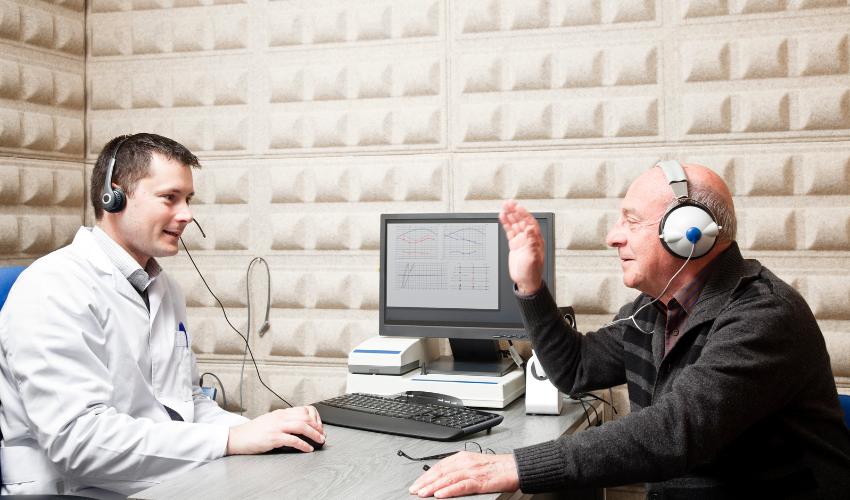If you’ve recently decided to book a hearing test, then you’re one step closer to resolving your hearing difficulties. We’re asked frequently by our customers what happens during a hearing test, as it can be daunting at first. So, in today’s article, we’re going to dive into what you will encounter during a hearing test.
Preparation
Preparing for a hearing test is the first step. Upon arriving for a hearing test, individuals can expect a streamlined process designed to ensure their comfort and efficient evaluation. The first step typically involves registration, where individuals provide their personal information and any necessary paperwork. This may include medical history, insurance information and a questionnaire. The questionnaire will consist of questions related to your hearing concerns, lifestyle, and noise exposure. After completing this process, you will be guided to the waiting area until you are called in for your appointment.
The examination room
Once you’ve been called in, you will be greeted by an audiologist who will guide you through the process and make you feel at ease. The room itself is typically designed to be comfortable, with specialised equipment and amenities necessary for the test.
One of the key components of the examination room is the presence of soundproofing or sound-treated walls to minimise external noise interference. This ensures that the test results are accurate and reliable by preventing ambient sounds from affecting your ability to hear the test stimuli. Additionally, the room is usually well-lit and organised, with the necessary equipment readily accessible to the audiologist.
You will then be seated and the audiologist will explain the test procedure in detail. Depending on the type of test being conducted, you may be asked to wear headphones or earphones connected to an audiometer; a device used to deliver specific sounds or tones at varying frequencies and intensities. Alternatively, the test may involve other equipment such as a tympanometer for assessing middle ear function or a speech audiometer for evaluating speech perception.
Throughout the test, you will be instructed to respond to different sounds or tones presented through the headphones or earphones. This may involve raising a hand, pressing a button, or verbally indicating when you hear a sound. The audiologist will closely monitor your responses and adjust the test parameters as needed to ensure accurate results.
If you live in Wimbledon, Teddington or Wallington and think you could benefit from a hearing consultation – book an appointment with us today.

Types of tests conducted
The primary test conducted during a hearing evaluation is pure-tone audiometry. This test measures your hearing sensitivity across a range of frequencies, typically from low to high pitches. You will wear headphones or earphones and listen for tones at various intensities, indicating when you can hear each tone by raising a hand or pressing a button. Pure-tone audiometry helps determine the softest sounds you can hear at different frequencies, providing valuable information about your overall hearing abilities.
In addition to pure-tone audiometry, speech audiometry is another common hearing test. It assesses your ability to hear and understand speech in both quiet and noisy environments. During speech audiometry, you will listen to recorded or live speech stimuli presented through headphones or earphones and repeat or respond to the words or sentences you hear. The test helps determine how well you can perceive speech sounds, which is essential for communication and understanding spoken language.
Tympanometry is another procedure often included in a hearing test. The test assesses the function of the middle ear and the mobility of the eardrum and the middle ear bones. A small probe is inserted into the ear canal, and air pressure variations are introduced to the ear while measurements are taken. Tympanometry can identify conditions such as fluid in the middle ear, eardrum perforations, or issues with the middle ear bones.

Reviewing results and recommendations
After the completion of the tests, the audiologist will review the results with you. This discussion is a crucial part of the hearing test process, as it provides insights into your hearing health and forms the basis for any recommendations or interventions that may be necessary.
They will interpret the test results to determine the nature and degree of any hearing loss present. Additionally, they may explain any abnormalities or patterns observed in the test results, such as conductive hearing loss, sensorineural hearing loss, or mixed hearing loss. This information will help you gain a comprehensive understanding of your hearing abilities and any areas of concern.
Based on the test results and your unique needs and preferences, the audiologist will provide personalised recommendations for further action. This may include options for treatment or management of hearing loss, such as hearing aids, ear wax removal, assistive listening devices, or auditory rehabilitation programs. If the test results indicate underlying medical conditions or issues that require further evaluation or treatment, the audiologist may refer you to a specialist for additional care.
In addition to discussing treatment options, the audiologist will offer practical advice and strategies for optimising your hearing health and communication abilities. This may include guidance on hearing protection, communication strategies for challenging listening environments, and tips for maintaining overall ear health.
Finally, throughout the discussion of results and recommendations, the audiologist will ensure that your questions and concerns are addressed thoroughly. They will encourage open communication and provide support and reassurance as needed, helping you feel confident and informed about your hearing health. By fostering a collaborative and patient-centred approach, the audiologist will ensure that you receive the best possible care and outcomes following your hearing test.
We hope you’ve enjoyed reading our latest article about what happens in a hearing test. If you have any more questions about hearing tests, get in touch with our friendly team today.
Alternatively, if you’re looking to book a hearing test – look no further than us here at The Hearing Specialist. Get in touch with our audiologists today!

